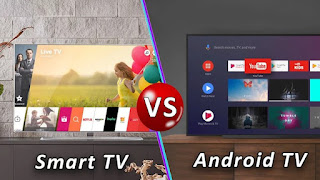Planning to buy a new television for home? Check out the 7 differences between Android TV and Smart TV so you don't buy the wrong one.
There's no denying that understanding the difference between Smart and Android TV can be very confusing. Because the two are very similar.
We can say that Android TV is basically a kind of Smart TV. However, there are slight differences that can make one more suitable than the other for placing at home.
The two are so similar, you could even say that Android TV is basically a kind of Smart TV. However, there are slight differences that can make one more suitable than the other for your home.
What are Smart TVs?
Can be called internet TV, Smart TV presents exclusive features and additional programs through internet connectivity. You can connect your Smart TV to the internet wirelessly or via an Ethernet cable to access online content.
Smart TV comes with an operating system similar to what you use on Smartphones and PCs. Most Smart TVs come with built-in apps like Netflix, YouTube, Facebook and others that let you play games, watch videos and stream movies.
What is Android TV?
Android TV is a type of Smart TV that has similar features such as built-in applications and internet connectivity. This device runs on the Android operating system made by Google.
Android TV has access to the Google Play Store, so it can download and update the latest app versions. As an added bonus, many Android TVs offer access to Chromecast and Google Assistant built in for a better TV experience.
7 Differences between Android TV and Smart TV?
1. Operating System
The main difference between Android TV and Smart TV is the operating system. Smart TVs are powered by different operating systems depending on the brand you choose. For example, LG uses an OS called WebOS, while Samsung Smart TV comes with an OS called Tizen.
In contrast, Android TV runs on the Android operating system developed by Google. It gives you a better overall experience as you can easily control your Android TV with an Android Smartphone or Smartwatch.
2. Application support
Smart TV vs Android TV, which is better in terms of app availability? Android TV will be the winner.
Although both of them support many built-in applications, thanks to Play Store support on Android TV, you have j6,000 applications, ranging from YouTube, Netflix, Disney Hotstar, Prime Video and others.
Smart TVs don't have this advantage as they only offer access to a few popular built-in apps. Not to mention, app updates on Smart TVs are hard to come by, so some apps are not supported.
3. Updates
Android TV not only offers a bigger collection of apps, but also wins the battle between Android vs Smart TV in firmware and app updates. Typically, Android TVs have active technology development, and are diligent about bringing out updates.
In addition, when connected to the internet, you can also enjoy automatic updates. Whereas many Smart TVs on the other hand don't get updates very often, and the TV OS becomes obsolete after a few years.
4. Voice assistant
Another notable difference between Android and Smart TV is the voice assistant feature. Android TV's built-in Google voice assistant makes it stand out from the competition.
With this feature, you don't need to use an input device as you can switch between channels and search for your favorite content online with voice control.
Indeed, many Smart TVs also support voice control, but their capabilities are not as good as Google Assistant.
5. Mirroring
Android vs Smart TV offers options for mirroring from smartphone to TV. However, screen casting on Android TV is easier to use because it comes with the Chromecast feature.
And you get crystal clear pictures and streaming video in high definition. On the other hand, even with the built-in screen mirroring feature on Smart TVs, pairing and connecting devices is a pain.
6. Navigation
To choose between Android vs Smart TV in terms of ease of experience, Smart TV has the upper hand. With a simple and user-friendly interface it makes it easier to switch between apps when they appear on the home screen.
As a result you don't have to spend a lot of time preparing it. On the other hand, Android TV can be difficult to navigate, especially for those who are not familiar with the Android ecosystem.
7. Performance
Smart TVs have faster performance due to a simple and optimized interface between hardware and software. While Android TV has slow performance, especially after several years of use.


